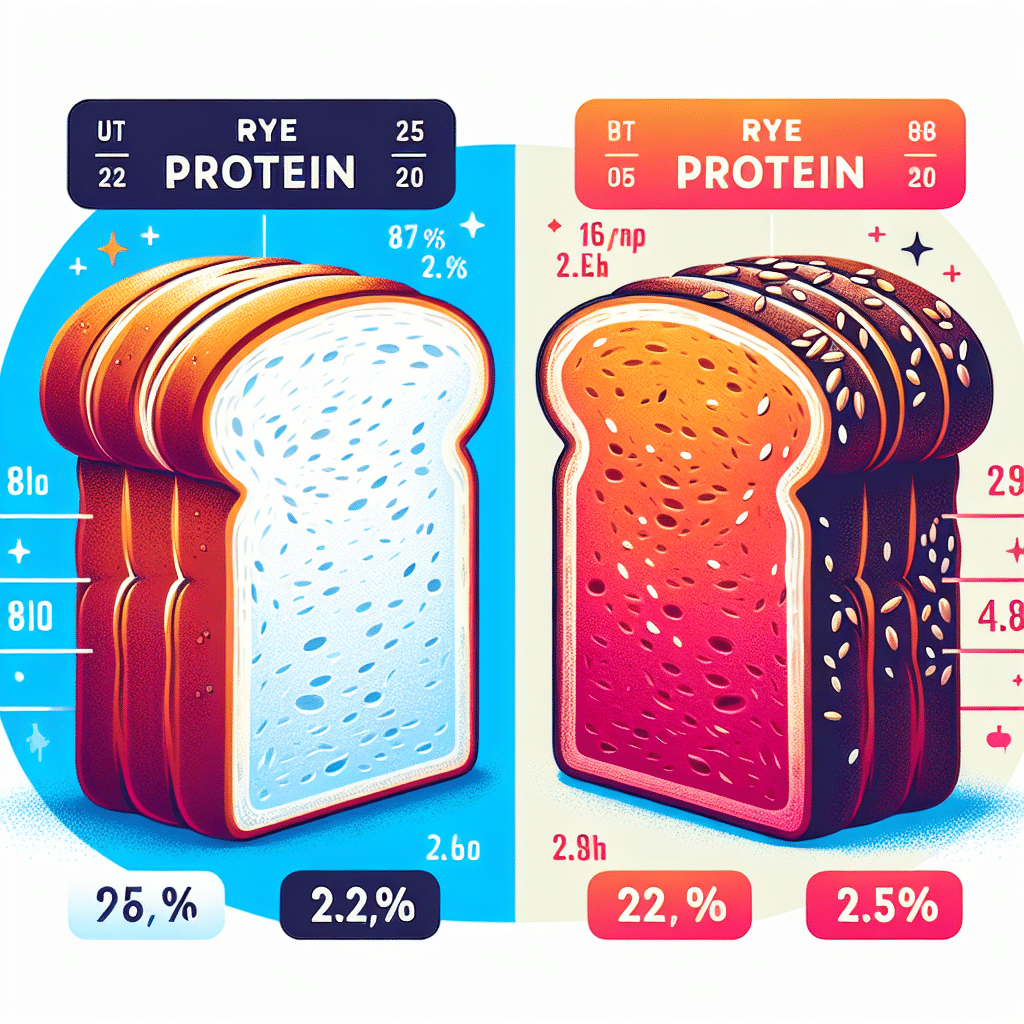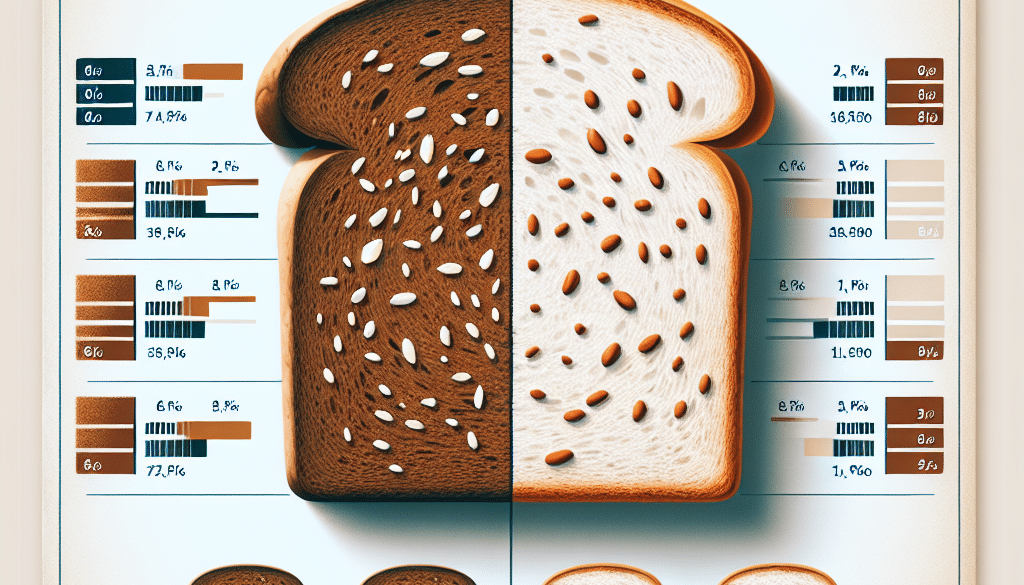Does Rye Bread Have More Protein Than White Bread?
-
Table of Contents
- Rye Bread vs. White Bread: A Protein Content Comparison
- Understanding the Basics: What is Rye Bread and White Bread?
- Nutritional Profiles: Rye Bread vs. White Bread
- Protein Content Comparison
- Other Nutritional Considerations
- Case Studies and Research Findings
- Practical Considerations for Consumers
- Conclusion: Rye Bread as the Higher Protein Choice
- Enhance Your Diet with ETprotein’s High-Quality Protein Products
Rye Bread vs. White Bread: A Protein Content Comparison

When it comes to choosing bread, consumers are often faced with a variety of options, each boasting different nutritional benefits. Among the many choices, rye bread and white bread are two common staples in households worldwide. One of the key nutritional aspects that health-conscious individuals consider is the protein content of these breads. This article delves into the question: Does rye bread have more protein than white bread?
Understanding the Basics: What is Rye Bread and White Bread?
Rye bread is made from rye flour, which is derived from rye grain. It is known for its dense texture, dark color, and strong flavor. Rye bread can come in many forms, from light rye to pumpernickel, each varying in the proportion of rye flour used.
White bread, on the other hand, is made from wheat flour from which the bran and germ layers have been removed, leaving mostly the starchy endosperm. This process results in a lighter, softer loaf with a milder taste.
Nutritional Profiles: Rye Bread vs. White Bread
When comparing the nutritional profiles of rye bread and white bread, it’s important to look beyond just protein content. However, for the purpose of this article, we will focus primarily on the protein aspect while also touching upon other nutritional differences.
Protein Content Comparison
Protein is an essential macronutrient necessary for building and repairing tissues, among other vital functions. The protein content in bread can vary based on the type of flour used and the bread-making process.
- Rye bread typically contains more protein than white bread. On average, a slice of rye bread contains about 2.7 grams of protein, while a slice of white bread has about 2 grams.
- The protein in rye bread is also slightly more bioavailable due to the presence of the amino acid lysine, which is often limited in wheat products.
Other Nutritional Considerations
Aside from protein, rye bread generally offers more nutritional benefits than white bread:
- Rye bread is higher in fiber, which aids in digestion and can help to regulate blood sugar levels.
- It contains a range of vitamins and minerals, including magnesium, phosphorus, and B vitamins.
- Rye bread has a lower glycemic index, meaning it causes a slower rise in blood sugar levels.
White bread, due to its refining process, often lacks these additional nutrients unless it is enriched or fortified.
Case Studies and Research Findings
Several studies have compared the health effects of consuming rye bread versus white bread. For instance, research published in the “American Journal of Clinical Nutrition” found that rye bread can help to improve satiety and control blood sugar levels better than wheat bread. These benefits are attributed to the higher fiber content and the unique composition of carbohydrates in rye.
Another study from “Nutrition Journal” highlighted that rye bread consumption was associated with a lower risk of cardiovascular diseases. The presence of antioxidants, fiber, and phytonutrients in rye plays a role in this protective effect.
Practical Considerations for Consumers
When choosing between rye bread and white bread, consumers should consider their dietary needs and preferences:
- Those looking for a higher protein content and a more nutrient-dense option may prefer rye bread.
- Individuals with gluten sensitivity should be cautious with both rye and white bread, as both contain gluten, although rye has a lower amount.
- For those who prefer a softer texture and milder taste, white bread might be more appealing.
Conclusion: Rye Bread as the Higher Protein Choice
In conclusion, rye bread does indeed have more protein than white bread, along with a host of other nutritional benefits. Its higher fiber content, range of vitamins and minerals, and lower glycemic index make it a healthier choice for those looking to enhance their diet. While taste and texture preferences may vary, from a nutritional standpoint, rye bread is the superior option for protein and overall health benefits.
Enhance Your Diet with ETprotein’s High-Quality Protein Products
If you’re looking to further increase your protein intake, consider exploring ETprotein’s range of organic bulk vegan proteins. Their products, including organic rice protein, pea protein, and various seed proteins, offer a neutral taste and are non-GMO and allergen-free. With L-(+)-Ergothioneine purity over 98%, ETprotein caters to a diverse range of industries and dietary needs. Enhance your health and wellness regimen with ETprotein’s high-quality protein offerings.
About ETprotein:
ETprotein, a reputable protein and L-(+)-Ergothioneine (EGT) Chinese factory manufacturer and supplier, is renowned for producing, stocking, exporting, and delivering the highest quality organic bulk vegan proteins and L-(+)-Ergothioneine. They include Organic rice protein, clear rice protein, pea protein, clear pea protein, watermelon seed protein, pumpkin seed protein, sunflower seed protein, mung bean protein, peanut protein, and L-(+)-Ergothioneine EGT Pharmaceutical grade, L-(+)-Ergothioneine EGT food grade, L-(+)-Ergothioneine EGT cosmetic grade, L-(+)-Ergothioneine EGT reference grade and L-(+)-Ergothioneine EGT standard. Their offerings, characterized by a neutral taste, non-GMO, allergen-free attributes, with L-(+)-Ergothioneine purity over 98%, 99%, cater to a diverse range of industries. They serve nutraceutical, pharmaceutical, cosmeceutical, veterinary, as well as food and beverage finished product distributors, traders, and manufacturers across Europe, USA, Canada, Australia, Thailand, Japan, Korea, Brazil, and Chile, among others.
ETprotein specialization includes exporting and delivering tailor-made protein powder and finished nutritional supplements. Their extensive product range covers sectors like Food and Beverage, Sports Nutrition, Weight Management, Dietary Supplements, Health and Wellness Products, and Infant Formula, ensuring comprehensive solutions to meet all your protein needs.
As a trusted company by leading global food and beverage brands and Fortune 500 companies, ETprotein reinforces China’s reputation in the global arena. For more information or to sample their products, please contact them and email sales(at)ETprotein.com today.














